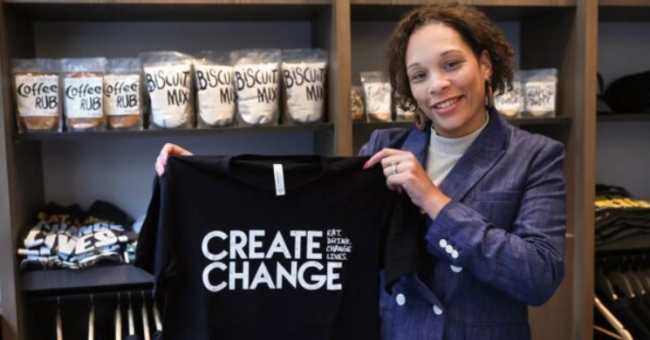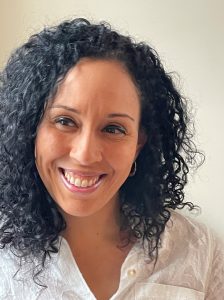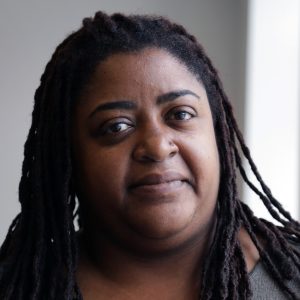
Meet the Picks for Allegheny County’s New Youth Detention Advisory Board
Cheyenne Tyler, executive director of Café Momentum’s Pittsburgh location, was appointed to Allegheny County’s Juvenile Detention Board of Advisors. (Photo by Anastasia Busby/PublicSource)
by Venuri Siriwardane, PublicSource
Experts and advocates want Allegheny County’s Juvenile Detention Advisory Board to bring transparency and accountability to a system long criticized for harming the youth it’s meant to rehabilitate. But it lacks enforcement power under state law — a limitation they sharply criticized in light of the county’s troubled history of youth incarceration.
The county closed its youth detention center in 2021 after the state revoked its license due to multiple violations. A previous advisory board was in place when the violations occurred during former County Executive Rich Fitzgerald’s administration.
New County Executive Sara Innamorato moved to re-establish the board nearly a year after the facility reopened as Highland Detention at Shuman, under private management by Adelphoi Western Region. Adelphoi — a group of nonprofits that faced lawsuits alleging negligence and abuse at its facilities — told PublicSource the county is pleased with its performance so far and pledged to work with the board on “enhancing advocacy for youth involved in the system.”
PublicSource set out to learn more about the eight citizens and officials appointed to the board, who have not yet been confirmed by County Council. Innamorato appointed four and picked one from a pool of three finalists chosen by a council committee’s vote. The remaining three were appointed by the court’s president judge, Susan Evashavik DiLucente. Innamorato, or her designee, and County Controller Corey O’Connor, or his designee, will complete the 10-person board.
Here’s what we found about their backgrounds and their plans for the work ahead, despite the board’s limited power.
Kathi Elliott, a psychiatric nurse practitioner and CEO of Gwen’s Girls, a nonprofit serving girls in the region who face racism, poverty and violence

Gwen’s Girls launched the Black Girls Equity Alliance. The group’s four teams — including one focused on youth justice — work to address structural issues affecting the county’s Black girls. They’ve published several reports, including one by the University of Pittsburgh’s Sara Goodkind about the overrepresentation of Black girls in the county’s juvenile legal system.
Elliott said she’ll bring to the board expertise the group developed during a decade of research. Most juvenile legal system institutions don’t meet the unique needs of girls, she added, noting that Shuman’s only operating pod houses boys.
In Elliott’s previous role at the Center for Victims, she worked with the county’s Juvenile Court to expand services for victims of youth offenses. There, she noticed a cycle: If a young, traumatized victim didn’t get enough support, “they may show up a few months later as a defendant.”

Garland is the only board member who disclosed lived experience in the juvenile legal system to PublicSource. He got involved with gangs as a teen in Philadelphia and spent more than two decades in prison. He completed a master’s degree in social work after he was released in the 1990s and built his career around helping other formerly incarcerated people.
He agreed with County Councilmember Bethany Hallam’s criticism of the board’s advisory nature. “I don’t want to be just an advisor,” he said. “We need teeth … and I’m going to do everything that I can to see what we can do to get some teeth.”
Cheyenne Tyler, executive director of Café Momentum’s Pittsburgh location, part of a national workforce development nonprofit that offers paid internships in its restaurants and wraparound services to youth impacted by the juvenile legal system
Tyler gave this rep orter a tour of the group’s sleek Downtown restaurant, decorated in warm hues and featuring an open kitchen staffed by young people. She listed the resources it offers them, including academic tutoring, mental health support and access to a pantry stocked with essentials such as deodorant and period supplies.
orter a tour of the group’s sleek Downtown restaurant, decorated in warm hues and featuring an open kitchen staffed by young people. She listed the resources it offers them, including academic tutoring, mental health support and access to a pantry stocked with essentials such as deodorant and period supplies.
She began her career as a case manager at a youth correctional facility in South Florida, which she said was a transformative experience. “I saw that there were young people who had gifts that had no idea that they had gifts,” she said. They get caught up in systems “sometimes by no no wrongdoing of their own, just because of the color of their skin, their zip code, their family. And I saw that there was an injustice, and I became very passionate about it.”
After moving back to her native Pittsburgh, Tyler became a supervisor in the Youth Support Partners program run by the county’s Department of Human Services, which offers peer support to young people in juvenile probation or other systems. She was also an administrator at Shuman for five years while it was operated by the county, including a role ensuring the facility complied with the Prison Rape Elimination Act.
She spoke openly about the violations that occurred at Shuman, which she categorized as administrative and physical. While she believes “physical intervention” is necessary if young people are putting themselves or others at risk, she said violations happened more often during those situations. “When there was injustice or unfair treatment of young people … absolutely people should be held responsible or accountable for that.”
Terri Collin Dilmore, an associate professor of psychology at Howard University and a clinical psychologist skilled in forensic evaluation of Black youth in the juvenile legal system
 Dilmore researches racial identity, multigenerational trauma in youth and interventions to meet their needs. Innamorato picked her among three finalists chosen by a County Council committee. She spent 15 years evaluating youth in the county and told the committee in March what she’s seen on the job.
Dilmore researches racial identity, multigenerational trauma in youth and interventions to meet their needs. Innamorato picked her among three finalists chosen by a County Council committee. She spent 15 years evaluating youth in the county and told the committee in March what she’s seen on the job.
“The most egregious thing that’s been happening over the last four years is we have not had a juvenile detention facility,” she said, describing what she’s seen kids go through in the Allegheny County Jail.” She said she’s witnessed them “being cat-called” by adults, “being mishandled” by some workers and “not having the mental health resources that these youth really do need.” The jail didn’t step up its efforts to separate kids and adults until this year, she added.
Tiffany E. Sizemore, a judge in the family division of the Court of Common Pleas
 Before joining the court, she was an associate professor of clinical legal studies at Duquesne University and directed its Youth Advocacy Clinic, which fought expulsions in school discipline cases. “Just one instance of exclusionary discipline increases a child’s chances of ending up in juvenile court,” she told Pittsburgh Lesbian Correspondents in 2021.
Before joining the court, she was an associate professor of clinical legal studies at Duquesne University and directed its Youth Advocacy Clinic, which fought expulsions in school discipline cases. “Just one instance of exclusionary discipline increases a child’s chances of ending up in juvenile court,” she told Pittsburgh Lesbian Correspondents in 2021.
Sorry, the comment form is closed at this time.
